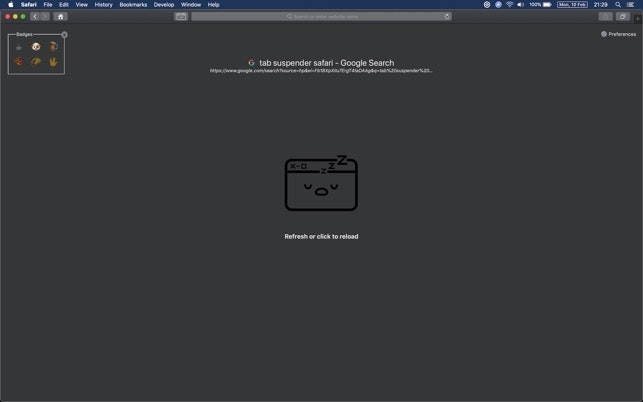

The UI and some features still need to be polished a bit and I plan a minor update next week but wanted to show this to the HN community to hopefully get some feedback. Tab Suspender for Safari is a tool that comes in the form of extension, which helps users to suspend those tabs which are not in the use of users on the. This extension is inspired by the The Great Suspender for Chrome Optionally, do not suspend tabs if on battery power or no network connections Detects tabs that contain active forms and will not suspend them if you don't want it Detects tabs playing audio and will not suspend them if you don't want it (experimental) Show a screen shot of the page just before it was suspended

Whitelist urls or domains that you do not want to suspend (You can still manually suspend them by using the menu) Some of the options you can configure are: The downside is that you of course need to re-load old webpages, which is no biggie for me when the alternative is a slower system.I believe this is the first Tab Suspender for Safari since the transition to the new Safari App Extension model.ĭepending on your tab count and how "heavy" the websites are, you can expect a considerable reduction of memory and CPU usage and indirectly your battery consumption, by automatically suspending the tabs you aren't using. And you just consolidated a lot of deferred writes in one disk wake up. Freeing up RAM is great for starting a new app that needs lots of memory and the app or data it needs has not been accessed recently.

My groups were then available on all devices, and the tabs that were different were added to each device. KEEP the data when it asks if you want to delete.
TAB SUSPENDER SAFARI FREE
The Mac will slow when after it uses up RAM and has to to pageouts/pageins.ĭoing a purge forces macOS to clean its RAM cache, doing I/O writes if necessary, then put the pages on the free list. Turn off iCloud sync for Safari on my iPhone (which was the only one different). MacOS operations in theory meets macOS in reality, and reality wins. Even when you have inactive memory macOS will need to do I/O first to save the data to disk before it can reuse the RAM. Supercharge your browser From anywhere in the browser, search for tabs or other work with laser precision. Tabs are constantly autosaved & can be restored in case of emergency. Watch the video Save tabs for later Never worry about losing work. Writing to disk during pagein/pageout activity slows down the Mac when RAM gets full. With tabs organized by context, it’s so much easier to switch between projects or workflows. Saving to disk slows down the system, virtual memory slows down the system, period. Apps that leak memory can’t have it reclaimed, as the “leaked” memory belongs to the process that’s leaking it. Firefox is a quite good browser too but has far fewer useful extensions.Īnd the built-in ad-blocking in both Mac and iOS versions of Brave (using, from what I understand, the guts of uBlock Origin) is very convenient, especially on iPhone.īig Sur is supposed to make it easy to translate Chrome extensions for use in Safari, so it will be very interesting to see how things shake out next year.īut the OS will do that on an as-needed basis by itself. But Chromium apps can use any of Chrome’s extensions, and I use a ton of those, ranging from privacy enhancers to ad-blockers, to extensions that customize Reddit and YouTube, to ones that save webpages as epubs, or implement dark mode on pages with a click, or enable right-click on sites that try turning it off, or grabbing RSS feeds, or block tracking pixels in email. I find that Chromium apps - Brave, Epic, Vivaldi, etc - are simply faster than Safari and handle most web pages better for some reason Safari tends to bog down when visiting some websites. I actually live inside four different writing apps.


 0 kommentar(er)
0 kommentar(er)
